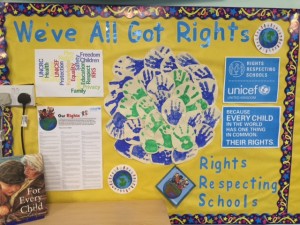Rights Respecting Schools Group
Rights Respecting Group
Our Rights Respecting Group take the lead with ensuring children’s rights are taught about and respected across the school. They are also responsible for steering the school towards our Silver Rights Respecting Schools Award.
 What is the Rights Respecting Schools Award?
What is the Rights Respecting Schools Award?
The Unicef UK Rights Respecting Schools Award (RRSA) supports schools across the UK to embed children’s human rights in their ethos and culture. The award recognises achievement in putting the UN Convention on the Right of the Child (UNCRC) at the heart of a school’s practice to improve well-being and help all children and young people realise their potential.
The award is based on principles of equality, dignity, respect, non-discrimination and participation. The initiative started in 2006 and schools involved in the Award have reported a positive impact on relationships and well-being, leading to better learning and behaviour, improved academic standards and less bullying.
Who is the Award for?
The Award is aimed at schools across the UK. We currently work with over 4,000 primary schools, secondary schools, schools for children and young people with special educational needs and pupil referral units across England, Northern Ireland, Scotland and Wales. Schools need to register with us to take part in the programme.
What does the Award involve?
Schools involved in the Rights Respecting Schools Award work towards recognition that they have embedded children and young people’s rights in their school’s practice and ethos. Schools are required to implement four evidence-based standards that cover the leadership of the school, knowledge and understanding of children’s rights, ethos and relationships and the empowerment of children and young people.
There are three levels to the Award:
The journey to Level 2, the highest award granted by Unicef UK, can take three to four years. Level 1 and Level 2 awards are valid for three years, after which time schools must be re-assessed.
How does the RRSA link with other school initiatives?
The RRSA programme unifies a range of educational priorities in all UK jurisdictions; the global dimension, social and emotional aspects of learning, community cohesion and sustainable development.
How is the RRSA funded?
As a registered charity we rely entirely on voluntary donations to fund our vital work for children and their rights. Therefore we charge for regional courses, school visits, local authority support, assessments and other activities. Our RRSA programme does not make a profit – it simply aims to cover our running costs.
What is a Rights Respecting School?
In the words of a pupil from a Primary Rights Respecting School: “A Rights Respecting School is a place where we can all feel confident with ourselves and it encourages us to use our voice. It’s a safe environment where everyone feels comfortable. We know we have to respect each other’s opinions and they have to respect yours too. Every child is treated the same in our school and we’re all special in our own way! A Rights Respecting School is a place where everyone cares for each other. It has helped me build my confidence. It has helped me raise awareness of injustice in the world.”
A Unicef UK Rights Respecting School is a community where children’s rights are learned, taught, practised, respected, protected and promoted. Children and young people and the school community learn about children’s rights by putting them into practice every day. The Award is not just about what children do but also importantly what adults do – in Rights Respecting Schools, children’s rights are promoted and realised and adults and children work towards this together.
“Rights are the context for all our work – they provide a framework for the whole jigsaw.” Primary school headteacher
What we see in schools that have achieved the Award
- All children and adults learn about the Convention. Children’s rights become an integral part of the school’s learning. “Learning about rights has made them [children] more confident about speaking out. They are more confident and articulate.” Parent
- Children, young people and adults in the school learn how the values and principles of the Convention help to create a safe and healthy environment. “We all know our rights and know that if our rights aren’t respected we can do something.” Primary pupil
- Children and young people meaningfully participate in the school’s life and have opportunities to express their views, be listened to and influence positive change in their school. In Rights Respecting Schools, children and young people are involved in how the Award is implemented in the school but are also involved in strategic decision-making; in decisions about their learning; and in views about their wellbeing. “Our views are taken very seriously. Our opinion matters because we are the pupils, we know what it is like in the school and their (adults) perspective is different from ours.’” Primary pupil
- Children and young people are empowered to access information that enables them to make informed decisions about their learning, health and wellbeing. “Teachers empower us and give us confidence.’” Secondary pupil
- Children and adults develop an ethos and language of rights and respect around the school. Rights and principles of the Convention are used to clarify moral developments and consider rights-respecting solutions – this all has a huge impact on relationships and well-being. “It has opened up a dialogue between teachers and pupils; you are empowered and encouraged to debate with teachers.” Secondary pupil
- Children and young people get very involved in raising awareness about social justice issues, both at home and abroad. They become ambassadors for rights and take part in campaigns and activities to help to bring about change. “It’s made me very aware of my surroundings. We do loads of things that make everyone else aware too, like sending red hands to Members of Parliament.” Primary pupil
“Since becoming rights-respecting our children feel happier, safe and confident and are ready to learn” Deputy headteacher at a Primary Rights Respecting School.

